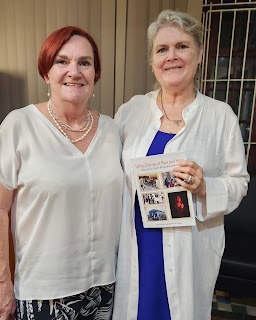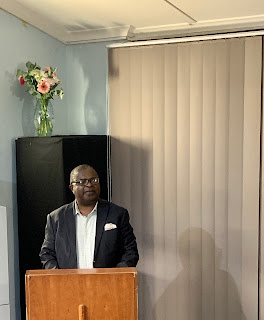Saturday, 16 December 2023
Thursday, 14 December 2023
Who we are: a community theatre musical
Saturday, 8 July 2023
LHM Abasha Bash! Festival 2023
13 June
(Text by Ayanda MaNgcobo Simelane)
Abasha Bash! is the performing arts of the Passbook Competition administered by the Durban Local History Museums. ARROWSA has been a long-standing partner of the competition and was once again represented in the 2023 installment of the competition. The auditions took place on 16 and 17 May 2023 and the finals on 13 June 2023.
ARROWSA chair, Ms Luthando Ngema and Dr. Mary Lange (Mel) formed part of the adjudication panel. Other adjudicators were from eThekwini Living Arts, K-Cap and the KwaZulu-Natal Department of Education. They witnessed amazing talent delivered by 17 schools from different parts of eThekwini.
The schools produced 10 minute performances under the theme: The Year of Imbokodo, in recognition of female leadership, the struggles and the role of women in society.
ARROWSA collaboration: Education and Outreach
Text by Ayanda MaNgcobo Simelane
ARROWSA is engaged in education and outreach, through
its partnership with the Bergtheil Museum, it has facilitated educational tours
to schools from different parts of eThekwini. The tours are based on cultural
heritage, incorporating classroom learning, museum education and the use of
storytelling in heritage education.
Thursday, 16 February 2023
Telling
Stories of Pain and Hope: Museums in South Africa and Ireland - Book Launch
written by Ayanda Ngcobo
(ARROWSA Local Authorities Portfolio leader and Museum Officer Bergtheil Local History Museum Durban)
The
book, Telling Stories of Pain and Hope: Museums in South Africa and Ireland,
was launched on 9 February 2023 at Bergtheil Museum in Westville. The book is
authored by Dr Mary Lange, Independent arts, culture and heritage researcher, ARROWSA management and CCMS, UKZN Honorary Lecturer and Prof. Emeritus Ruth Teer-Tomaselli of the Centre for Communication, Media and Society (CCMS), University of KwaZulu-Natal (UKZN) and published
by the University of South Africa (UNISA) Press.
The book launch was beautifully opened by performances by a group from ARROWSA Bechet, alumni and South Roots International youth that was captured in three videos and followed by a performance by ARROWSA alumnae, Monique Mukendi.
The MC for the evening was Mrs. Mohau Qalaza, Senior Curator of the Durban Local History Museums and based at the Bergtheil Museum.
Dr
Nthoesane, representing UNISA Press, was the first speaker and his remarks on
the book were centered on how it will set the stage for generations to bring
life to what is kept in museums.
Dr Lange, of ARROWSA management and CCMS,UKZN, in her talk focused on museums and storytelling and where it is used as a sources on the lifestyles, belief systems and moral and values of people in the past and forms part of experiential learning. The spiritual wellbeing of the individuals telling traumatic stories in museums and their connection to themselves, others and with the environment were some of the key points in her address. The book explores how individuals, or their descendants, who have suffered traumatic experiences, tell these stories which include conflict and forced removals and how doing this impacts their spiritual wellbeing. Some of the museums which are covered in the book include the District Six Museum in Cape Town, Ncome and Blood River sites in Dundee, KwaZulu-Natal.
Prof Emeritus Teer-Tomaselli, of CCMS, UKZN, focused on the spaces and places where traumatic events took place and why the sites need to be commemorated. She also explained how the book explores how these sites remain sustainable and what happens if storytellers move on. Her talk also discussed briefly how structures have meanings and stories to tell. Teer-Tomaselli referred to places like the Constitutional Hill describing how it urges one to imagine the spirits that are there. She also referred to the Bloody Sunday massacre that took place in Derry, Northern Ireland.
The
first respondent was Dr Mlungisi Ngubane, the director of uMsunduzi and Ncome Museums.
He started his discussion on issues of social cohesion and referred to the
Ncome and Voortrekker reconciliation bridge. He emphasised how healing is still
an ongoing process and the process of healing is needed for pain to go away. He
referred to stories narrated at KwaMuhle Museum in Durban and referred to the
movement against historical statues and museums that were created to address
past imbalances. Ngubane stressed the need for museums to move away from being dumping
sites but should rather be places that make people talk. People need to talk
about what they see in museums. Overall, he emphasised how South Africa has not
healed, histories like that of the 16 December 1838 war over land between amaZulu and the Voortrekkers are still painful and people have not healed. Ngubane
reiterated on how the book addresses a contemporary need in museums.
The
second respondent, Prof. Emeritus Donal McCracken pointed out how museums deliver
a message and deal with controversial subjects. He drew on examples from Northern
Ireland and South Africa to offer a discussion about stories of trauma that form
part of museums. This includes civil wars in both Northern Ireland and South
Africa.
The
main programme ended with closing remarks from Mrs. Innocentia Swanepoel who
reiterated that the book is an important contribution to museum studies.
The
book launch was well attended and attracted academics, museum professionals,
local media and stakeholders from arts, culture and heritage spaces. ARROWSA management and ARROWSA Bechet learners were also represented at the launch.
Copies of the books are available through Unisa Press. See https://www.unisa.ac.za/sites/corporate/default/Unisa-Press/Books/History-and-Political-Africa/Telling-Stories-of-Pain-and-Hope


































